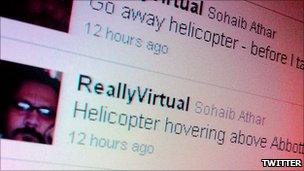Bin Laden raid was revealed on Twitter
- Published

Sohaib Athar said he was one of the few people using Twitter in Abbottab
The raid that killed Osama Bin Laden was revealed first on Twitter.
An IT consultant, living in Abbottabad, unknowingly tweeted details of the US-led operation as it happened.
Sohaib Athar wrote that a helicopter was hovering overhead shortly before the assault began and said that it might not be a Pakistani aircraft.
He only became aware of the significance of his tweets after President Obama announced details of Bin Laden's death.
Mr Athar's first posting on the subject came at around 1am local time (9pm BST).
He wrote: "Helicopter hovering above Abbottabad at 1AM (is a rare event)."
Soon after, he reported the sound of an explosion, now known to have been US forces blowing up their damaged helicopter.
"A huge window shaking bang here in Abbottabad Cantt. I hope its not the start of something nasty :-S"
Throughout the raid, Mr Athar was drawing on information from friends in the local area who were also online.
"The few people online at this time of the night are saying one of the copters was not Pakistani..."
"People are saying it was not a technical fault and it was shot down. I heard it CIRCLE 3-4 times above, sounded purposeful."
US officials stated that the raid took less than 40 minutes, but Mr Athar said there was still a military presence in the area two hours later.
"And now, a plane flying over Abbottabad..."
In his Twitter biography, Sohaib Athar describes himself as: "An IT consultant taking a break from the rat-race by hiding in the mountains with his laptops."
However, his postings during and after the raid reveal a frustration that world events had caught up with him.
"I guess Abbottabad is going to get as crowded as the Lahore that I left behind for some peace and quiet. *sigh*"
Mr Athar told the BBC's Nosheen Abbas in Pakistan that his tweets has led to a deluge of interview requests from media organisations around the world.
He also said that he was not surprised to be the only person writing about events as they happened.
"I've been tweeting for about 5, 6 years, and been tweeting about Abbottabad because no one really talks about it,
"In fact, not many people use Twitter here. Everyone uses Facebook," he said.
Twitter confirmation

Political aide and tweeter @keithurbahn worked out what was happening before the announcement
Even before President Obama confirmed the death of Osama Bin Laden, informed tweeters were speculating online about the reason for a hastily-organised White House press conference.
Keith Urbahn, chief of staff to former US defence secretary Donald Rumsfeld wrote: "So I'm told by a reputable person they have killed Osama Bin Laden."
While some observers have cited Mr Urbhan's tweet as further evidence that the mainstream media is struggling to keep up with Twitter, the author himself was sceptical.
He wrote later: "My source was a connected network TV news producer. Stories about 'the death of MSM' because of my "first" tweet are greatly exaggerated."
In another tweet, he said: "As much as I believe in rise of "citizen journalism," blogs, twitter etc supplanting traditional media, my tweet isn't great evidence of it."
Revolutionary tool
In the five years since Twitter was created, it has played a growing role in the reporting of world events.
The first glimpse that many people had of the site's potential was in 2009 when a US Airways plane made an emergency landing on New York's Hudson.
Ferry passenger Janis Krums tweeted a picture, external of the stricken aircraft, moments after it came down.
More recently, Twitter has been hailed as a catalyst in making world events happen.
Anti-government protesters in the Middle East and parts of Africa have made extensive use of the website, along with Facebook to disseminate their messages.
The 2011 Egyptian uprising, which led to the ousting of President Hosni Mubarak, has been widely referred to as the "Twitter Revolution".